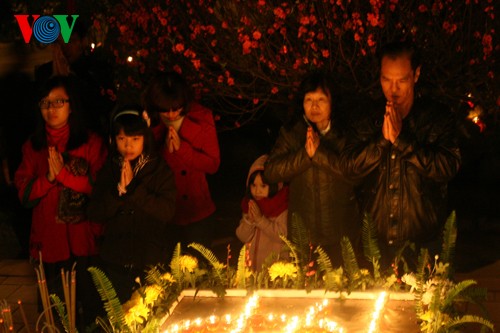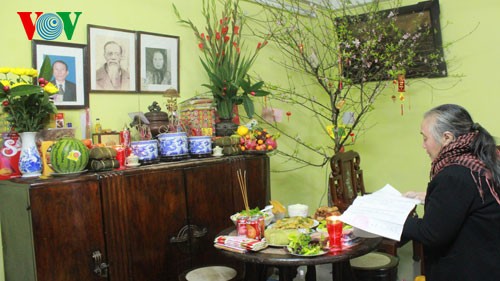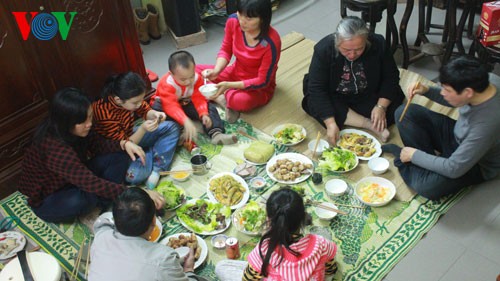(VOVworld) – According to a traditional perception, if things go smoothly during Tet, good luck will come all year round. Vietnamese practice dos and don’ts with a wish for all the best in the new year.
For the Vietnamese people, Tet is the most important festival of the year, opening a new circle of life, new sentiments and relationship. People observe dos and don’ts, wishing for a new year of good luck. Superior Buddhist monk Thich Nhat Tu, an expert of folk belief, explains: “Dos and don’ts are popular folk customs and assumptions associated with belief whose universal truth is unverified. From one generation to another, customs and common practices are inherited and popularized. People rely on them because they are afraid that if these customs are not pursued, their lives, health, longevity and career will be affected by dos and don’ts. That’s why these customs are passed down for a long time”.
 |
| Going to pagoda on New Year Eve |
 |
| Offering incense to ancestors on New Year Eve |
People avoid to sweep their houses during the first 3 days of the Lunar New year because it is believed that the God of Prosperity will be driven away, taking away with him money and property from the house owners. So on the last day of the old year mo matter how busy people are, they clean their houses, gardens and altars. This work should be done for the New Year Eve. In the southern region, people put away their brooms after sweeping houses because they believe that if their brooms are lost during Tet, their property will be stolen.
The northerners now still observe the custom of selecting the first visitor of their houses in the New Year. Bui Thi Nhuong in Truong Dinh ward, Hai Ba Trung district, told VOV: “Those, who lost their relatives in the old year or are not of compatible age with the house owners, chose not to be the first visitors. On the first day of the New Year, people don’t give away matches or lighters because by doing so they believe that they will give away their luck. It is not welcoming that a cat runs into somebody’s house because cats represent poverty. But a dog running into house is believed a good omen”.
 |
| A New Year feast |
Tet is a joyful and sacred festival. People are aware of dos and don’ts for full enjoyment. Pham Van Hung, a resident of the southern province of Dong Nai, told VOV:“Talking about the first New Year guests, southerners do not take into account visitors’ age. People who find themselves unsuccessful and unlucky in the previous year avoid visiting others on the first day of the New Year. They may come on the second day or come after being visited”.
On the first days of the New Year people refrain from borrowing money or assets to prevent from falling into financial difficulties. Many house owners don’t like others to come to their house ask for fire or water in the New Year because fire and water are compared as a blessing.
The Vietnamese also select days to go out. The 5th, 14th and 23rd days of the lunar calendar are believed inappropriate for embarking on any journey.